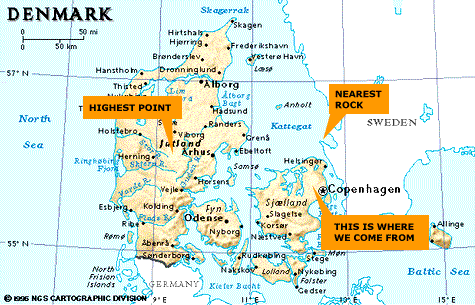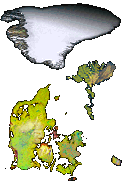About Denmark
History
During the Middle Ages, the Viking raiders and conquerors
were largely Danes. For a time the Danish realm included most
of Scandinavia and England. The Danish kingdom was a major power
in northern Europe until the seventeenth century, when it lost
a large portion of land to what is now southern Sweden. As punishment
for supporting Napoleon, the Congress of Vienna took Norway from
Denmark in 1815.
Denmark has existed since around the year 750. The monarchy
became constitutional in 1849.
Danish possessions include the Faeroe Islands and Greenland
(the world's largest island). Iceland was a former Danish possession,
but it declared its independence when Denmark was occupied by
Nazi Germany in World War II.
Type of Government: The Kingdom of Denmark
is today a constitutional monarchy. The symbolic chief of state is the queen
or king. The only real power in that position lies in the ability to appoint
the prime minister (who is the head of the government) and the cabinet ministers.
These officials represent the true power in government. There is one legislative
body, the 179-seat Folketing.
Language: Danish is the
official language. English is taught after the fifth grade; it
is the Predominant second language, and a majority of Danes speak
it with a high level
Demographics: The population
of Denmark is a little over 5.1 million. The two largest cities
are Copenhagen (the capital) and Århus. Almost 99 percent
of the Danes live in cities. Denmark continues to have an extremely
homogeneous society, but the numbers of Eskimos and Faeroese are
growing. Denmark's per capita GDP, at $20,000, is one of the highest
in the world, and personal income is evenly distributed.
Cultural Orientation
Cognitive Styles: How Danes Organize
and Process Information: The Danes are a proud people
who tend to be satisfied with their own accomplishments and thus
do not need (and are not open to) information or help from others.
Their education is moving away from rote learning and toward the
application of abstractive, conceptual thinking. They tend to
follow universalistic rules of behavior rather than react to particular
situations.
Negotiation Strategies: What Danes
Accept as Evidence: Truth is centered in a faith in
the ideology of social welfare, with objective facts used to prove
a point. Subjective feelings do not play a part in negotiation
processes. Value Systems: The Basis for Behavior Denmark is a
social welfare state in which the quality of life and environmental
issues are given top priority. The following three sections identify
the Value Systems in the predominant culture-their methods of
dividing right from wrong, good from evil, and so forth.
 Locus
of Decision Making: Danes have a strong belief in individual decisions
within the social welfare system. There is a strong self-orientation, but with
an obligation to help those who are not able to help themselves. There is an
emphasis on individual initiative and achievement, with one's ability being
more important than his or her station in life. The dignity and worth of the
individual is emphasized, along with the right to a private life and opinions.
Locus
of Decision Making: Danes have a strong belief in individual decisions
within the social welfare system. There is a strong self-orientation, but with
an obligation to help those who are not able to help themselves. There is an
emphasis on individual initiative and achievement, with one's ability being
more important than his or her station in life. The dignity and worth of the
individual is emphasized, along with the right to a private life and opinions.
Sources of Anxiety Reduction:
Life's uncertainties are accepted, and anxiety is reduced
by a strong social welfare system-the government is there to serve
the people. Though individualistic, Danes are resigned to a social
welfare state in which there is little distinction avail- able
through individual accomplishment. Young people are encouraged
to mature early and to take risks to develop a strong self-image.
Issues of Equality/Inequality:
Denmark basically has a middle-class society, with family
needs as the central issue of social policy and governmental intervention.
Danes strive to minimize social differences, so there is very
little evidence of poverty or wealth, although they exist. Nationalism
transcends social differences, and a largely homogeneous population
minimizes ethnic differences. In this society, upper-class husbands
and wives share the responsibilities of child care.
Business Practices
Appointments
- Remember that many Europeans and South Americans write the
day first, then the month, then the year (e.g., December 3, 1999,
is written 3.12.99). This is the case in Denmark.
- As in the rest of Scandinavia, summer is a time of leisure.
It is both difficult and inconsiderate to try to conduct serious
business during July and August. Many firms close for extended
periods during these two months to allow their employees to take
summer vacations. Danes have five weeks of paid vacation per
year.
- Business hours vary throughout Denmark. Opening times range
from 8:00 to 9:00 A.m. and closing times from 4:30 to 5:30 P.M.
Offices operate on a five-day schedule.
Negotiating
- The Danes tend to get down to business right away, with a
minimum of small talk.
- Danes are relatively informal. You can introduce yourself
to the executive with whom you will meet, rather than expecting
the secretary to introduce you.
- Be prepared to give detailed briefings, since Danes are rather
meticulous.
- Danes are often quite frank in their manner of speaking.
Statements are often direct but are not meant to be insulting
in any way.
- Avoid making any comments that could be regarded as personal.
Even complimenting someone on his or her clothes can be taken
as too invasive
- The Danish sense of humor, in general terms, is more reserved
or dry than the United States citizen.
- Danes find the U.S. custom of striking up conversations with
people we don't know very odd. Don't be surprised or insulted
if a Dane with whom you attempt to make small talk is not responsive.
- Danes are very tolerant; it is not advisable to criticize
other people or systems.
Business Entertaining
- The main meal of the day is dinner. Very popular.
- The "Store Kolde Bord", a cold buffet, is very popular at is eaten
at lunch.
- Toasts in Denmark can be quite formal. Never toast your host
or anyone senior to you in rank or age until he or she has toasted
you first. Never taste your drink until the host has said the
traditional toasting word, Skoal.
- A traditional Danish drink, aquavit (literally, "water
of life"), is quite potent. Be forewarned, as Danes often
like to share this alcoholic beverage with their guests.
Cultural note:
- If you are invited to a Danish home for dinner, be prompt.
There is usually no predinner cocktail, so you may be led straight
to the dinner table.
- In a Danish home, assume very proper manners. For example,
your host will suggest where you should sit. (At the table, the
host and hostess usually sit at opposite ends, with the guest
of honor next to the host.)
- Expect to be at the table for a long time. Danish dinners
can stretch out over four or five hours- You should not rise
from the table before your hostess does.
- It is impolite to leave a host's home too soon after dinner.
Cocktails are taken after dinner, not be;or-- These may be at
the table or in the main room. It is not unusual for a dinner
party to last until 1am
- Danes hold their fork in their left hand, while their knife
remains in the right.
- To indicate that you have finished eating, place the knife
and fork side by side on the plate, pointed away from you. Be
sure the fork's tines are up; tines down means that you want
more food.

The Kingdom of Denmark |
Time:
Local time is one hour ahead of Greenwich Mean Time (G.M.T.
+ 1), or six hours ahead of U.S. Eastern Standard Time (E.S.T.
+ 6).
Protocol
Greetings
- It is common to rise when being introduced to someone, and
to shake hands with both men and women. Handshakes are firm but
brief. When greeting a couple, it is customary to shake hands
with the woman first.
- Your colleague will usually shake your hand when leaving
as well.
- Danes say the traditional greeting heij, which sounds exactly
like the America.-i "Hi," when both greeting and departing.
- The common U.S. greeting "Hi, how are you?" will
lead a Dane to think you really want to know how he or she is
doing. A preferable greeting would be "Hi, I'm pleased to
meet you."
Gestures
- The gesture North Americans use to indicate that someone
is crazy (index finger circling while pointed at one's temple)
is used to insult other drivers while on the road.
- The North American "O.K." gesture (thumb and forefinger
forming a circle) can be taken as an insult in Denmark. Summon
waiters by raising your index finger.
- When ascending a flight of stairs, men precede women. When
descending, women precede men.
- At the theater, enter a row with your back to the stage (so
that you face people seated in the row). It is considered insulting
to squeeze past seated people with your backside facing them.
Gifts
- Gifts are not required in a business relationship.
- It is quite acceptable to bring a bouquet of flowers or chocolates
to a host's home. If you wish to give flowers to your hostess,
it is best to have them sent ahead of time, so as not to burden
her with taking care of them when you arrive.
- An illustrated book from your region of the United States
makes an appropriate gift.
Dress
- High-ranking Danish executives frequently host black-tie
dinners. Male executives should consider bringing a tuxedo along;
women will need an evening gown.
- Danish business practices are similar to American traditions.
Conservative dress will always be appropriate.
- Danish casual attire is still conservative, although jeans
that are clean and pressed will be seen. At the beach many women
wear topless bathing suits.
- Red is a positive color in Denmark.
Comments to: feedback@willerup.com
 Locus
of Decision Making: Danes have a strong belief in individual decisions
within the social welfare system. There is a strong self-orientation, but with
an obligation to help those who are not able to help themselves. There is an
emphasis on individual initiative and achievement, with one's ability being
more important than his or her station in life. The dignity and worth of the
individual is emphasized, along with the right to a private life and opinions.
Locus
of Decision Making: Danes have a strong belief in individual decisions
within the social welfare system. There is a strong self-orientation, but with
an obligation to help those who are not able to help themselves. There is an
emphasis on individual initiative and achievement, with one's ability being
more important than his or her station in life. The dignity and worth of the
individual is emphasized, along with the right to a private life and opinions.